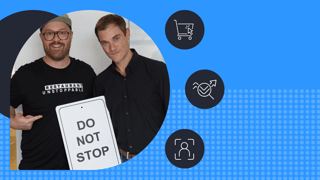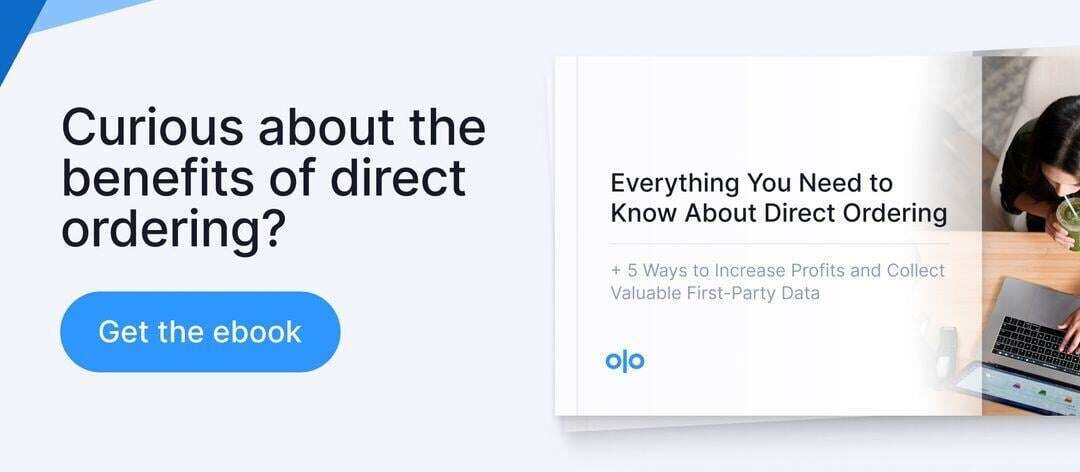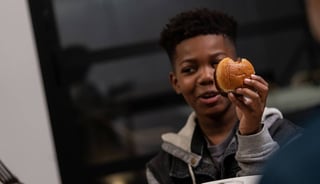
This article outlines:
A summary of Noah Glass’ recent appearance on “Restaurant Unstoppable”
Highlights from his conversation with host Eric Cacciatore
How to listen to or watch the entire conversation
Olo Founder and CEO Noah Glass recently sat down with Eric Cacciatore of the Restaurant Unstoppable Podcast to discuss Olo’s evolution—from a text-message ordering solution to an industry-leading open SaaS platform—and how restaurant brands are leveraging technology to optimize operations, enhance the guest experience, and maximize revenue.
Keep scrolling to read some of the main takeaways. Then, listen to the full podcast or watch the episode on YouTube.
The Build vs. Buy Debate
As with most conversations surrounding restaurant technology, build vs. buy was a hot topic. Noah and Eric discussed the fact that not every brand has the budget or resources to build its own tech stack, as well as the common misconception that build vs. buy is a one-time choice.
In addition to the upfront cost of building software, for example, restaurants also have to consider the ongoing costs of regular maintenance and ensuring optimal performance, security, and reliability as guests’ needs change and technology evolves.

Why Direct Ordering Matters
While Noah and Eric acknowledge in the podcast that third-party marketplaces have proven vital for boosting brand awareness and guest acquisition, they talk at length about the benefits of direct ordering for restaurants and guests alike.
Noah explains that restaurant brands want as many people as possible to order directly from their website or app to collect essential first-party data (visit frequency, favorite menu items, purchase behavior, lifetime value, etc.). These insights enable them to better understand, serve, and market to guests.
When guests order via third-party marketplaces, restaurants are blocked from that data altogether. To stay competitive, Noah recommends brands look to the hotel and travel industries—which went through the same battle 15 years ago with online travel agencies—to find strategies for empowering guests to order direct. For example, brands can offer direct orderers the lowest prices, access to the full menu, loyalty rewards, and other perks.
He goes on to say that because restaurants want the kitchen to be at peak capacity through the most profitable channels, they should prioritize those that enable them to make the most profit, own the guest relationship, and retain guests. In other words, direct ordering.
The Power of First-Party Guest Data
To further illustrate the value of direct ordering, Noah shares some of the benefits with listeners, including owning the guest relationship, building actionable guest profiles, and driving retention. He explains that when you can access and analyze first-party data from digital touchpoints throughout the guest journey, you can offer next-level hospitality by predicting their needs and also influence their behavior.
For example, rather than sending batch-and-blast emails to everyone, you can make guests feel heard and appreciated by tailoring messages, recommendations, and offers to individual preferences, purchase history, and more.
As they talk through the possibilities, Noah and Eric come to the same conclusion: restaurant brands that view data as a superpower—and use it to enhance the guest experience—will come out on top.

Unlocking Guest Lifetime Value
When discussing where the restaurant industry is headed, guest lifetime value (GLV)—what Noah refers to as ”the north star metric for restaurant operators in the digital era”—takes center stage.
He shares that beyond ordering and payments, a guest data platform (GDP) can turn insights from every digital touchpoint into one, unified guest profile. This enables brands to unlock the lifetime value of nearly 100% of guests and leverage that data to make informed business decisions across departments, including marketing, real estate, and operations.
To maximize ROI across the board, he says restaurants must be able to discern which guests are most valuable by recency, frequency, and spending, and which guests are simply one-time visitors motivated by a discount. Why? Because, on average, 60% of restaurant revenue is driven by just 20% of guests.
Noah advises brands to be careful not to confuse loyalty members with high-GLV guests. A loyalty program is considered high-performing if it accounts for just 25–35% of a restaurant brand's guest base—and that may not include those with high GLV.
We want restaurants to be more hospitable and more human and [for Olo] to be the technology platform underneath that's making that possible.
Preparing For a Passwordless Future
Eric and Noah go on to talk about restaurant payments and how brands are racing to meet the evolving needs of digital-first guests.
When digital orderers elect to check out anonymously, Noah says it’s a lose-lose situation for the guest and the restaurant. Guests have to re-enter their custom order and payment information each time they return, whereas brands can’t tie the transaction back to a guest profile. In other words, the restaurant doesn’t know if that guest has ordered 20 times before or is brand new.
To eliminate friction in the checkout process, he says some restaurant brands are following in the footsteps of e-commerce and adopting modern payment solutions that offer passwordless login, digital wallet support, and increased security.
Want to go deeper on all of these topics? Listen to the full podcast or click the button below to watch the episode on YouTube.
To learn more about Olo’s end-to-end open SaaS platform for restaurants, request a demo.
Photo credit: Restaurant Unstoppable
